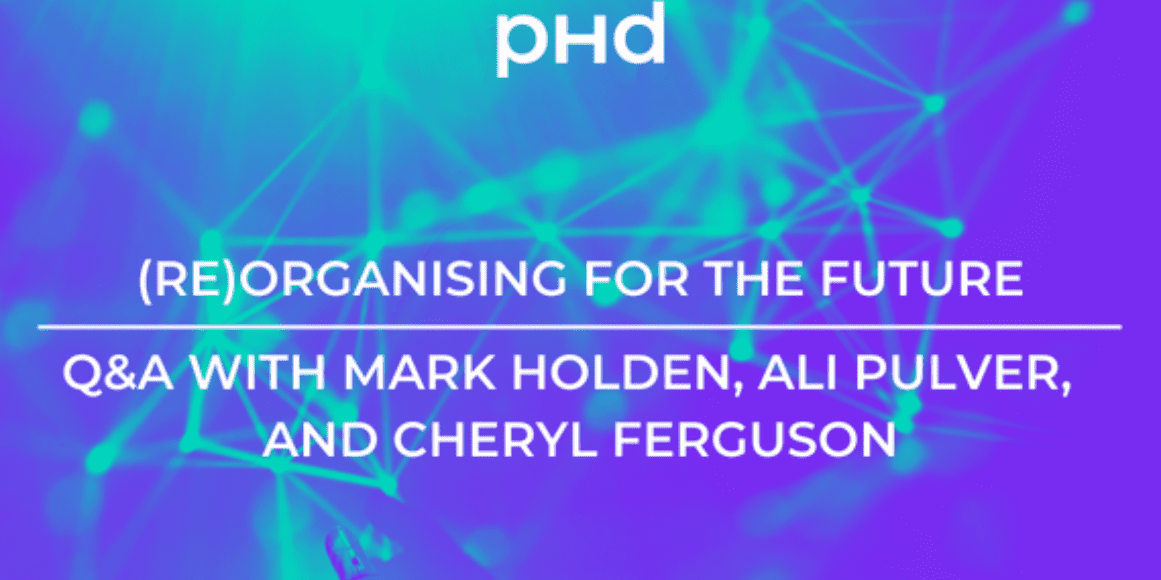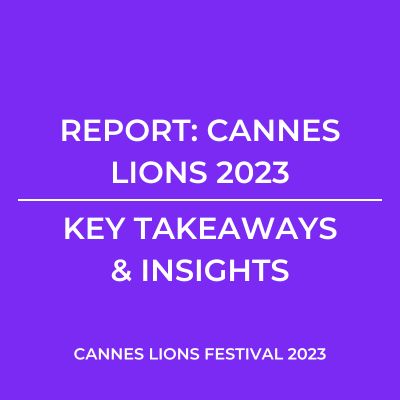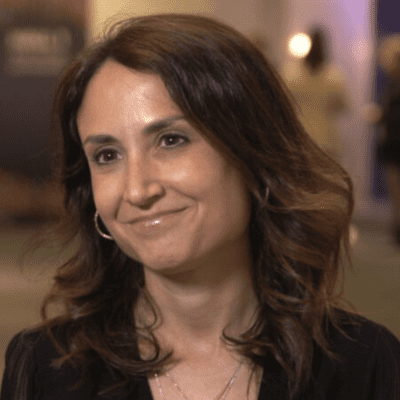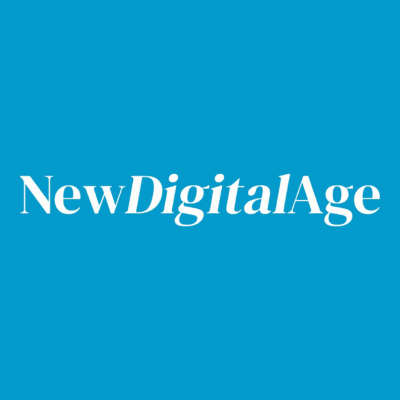Episode overview
In the wake of the global pandemic. ways of working are changing, consumer behaviours are evolving, and the global economy is in flux.
In response, many organisations are being forced to change to reorganise, to better serve the shifting – and sometimes, contradictory, needs of their customers, employees, and shareholders. But how do you get organisational change right?
To find out, we spoke with Mark Holden, PHD’s Worldwide CSO, and the lead author of Shift; Ali Pulver, who leads Omnicom’s optimisation group; and Cheryl Ferguson, president and co-founder of Dagger Wing Group, Omnicom’s Global Change consultancy.
PHD: What do we mean by organisational change… and what’s driving it?
MH: We, as an industry, have developed a lot over the last ten years. And with that, there’s been a rampant and further development of all the different capabilities that we need, whether it’s in routine services, like operations and tech management, etc., or whether it’s advanced capabilities such as audience creation, premium development, and advanced analytics
What’s happened is we’ve done that quickly, as we’ve had to do it quickly, and we’re now sitting back and looking at what we’ve created and we’re just wondering now, is everything in its right place? Are things outsourced that perhaps should be in-house? All things in-house should be outsourced. Do we have capabilities in hubs where they should be offshored, where they could rethink routine services?
It’s now just starting to kind of look at what we’ve created and just go, is it fit for purpose, and as part of that, what’s the process and how does water flow through the pipes when we run it today? I think that’s what’s started to happen now.
It’s coming up a lot with clients we’re finding, So I feel like organisation design is sort of a capability that we as agencies need to start to build into our products.
PHD: Why do you think it’s so important now? And what do you think is driving clients to see its importance now versus previously?
MH: Marketers are under a lot of pressure to drive down costs, looking for efficiencies, but for growth too, to really be seen to grow their organisation, and that can’t just always come from pouring more money into it. We need to make sure that the money goes further.
You can make some dramatic changes to effectiveness through how you make changes to the organisation. And I’d probably go as far as saying I’d be surprised if any organisation is fully optimised, so, therefore, logically, every organisation has money on the floor that they haven’t picked up yet, that they could quite pick up through a better organisation of how everything functions.
PHD: What is PHD doing to help clients successfully reorganise these media teams?
MH: We have developed an organisation with design workshops and supporting tools backed by research with marketing practitioners to help us start to logically identify the best location and capabilities for our clients. That’s something that we think is important that we can provide.
PHD: What sort of changes are you seeing happening at that bigger level across broader marketing departments?
AP: A lot is going on across the sectors and some things are consistent across these different industry verticals, and some unique nuances.
But I think some of the larger trends, those new capabilities that marketers are having to manage, the reality is that they’re quite strapped, and so we’ve seen that our client marketing teams have had to take on more responsibility, often with the same or fewer resources. And that’s led to marketers outsourcing more to agencies – specifically more of that upstream strategy and product planning function.
The good news is that our agencies are in a good position to do this work, and they’ve been thrilled because they feel that our creative product is better when they’re involved earlier on.
But that’s a shift, right? And a shift in resourcing. That’s how a lot of our clients have approached things.
PHD: What are the benefits of reorganising teams and departments?
AP: If done right, [companies] can see improved efficiency of the work that they do that includes cost savings, speeding up time to market, all of those good things.
Also, marketing effectiveness, improvement, just better quality work, better ROI.
Then, ultimately, talent retention, which I think so often when we’re talking with procurement teams, maybe isn’t always top of the list as everybody’s pushing to do better, faster, and cheaper.
But the reality is that, on the client side and the agency side, we all want to work on great work, and certainly coming out of the pandemic when we’ve all evaluated our lives a bit differently, I think talent retention is just a huge component, for certainly on the agency side.
Also, with most of our clients, there’s a lot of legacy knowledge we’re trying to maintain so I think those are the key benefits: Improved efficiency, marketing effectiveness, and talent retention.
PHD: I think what we’re sort of seeing here is that this isn’t a box-ticking exercise or a cookie-cutter approach. What’s your take on this?
CF: The reality is, is that even when change is good for business, for customers, for brands, change is hard. Human beings are hardwired to resist change.
And, ultimately, the sad reality with transformations when you’re transforming or changing organisational structures and models, only one in three change projects succeeds in achieving its objectives.
And the reason that it often fails is people factors. So, when we look at that, you can design great things, and everybody can have a lot of energy and ambition.
But there are some challenges in implementing it and making the vision come to life.
PHD: Is there a danger of change for change’s sake?
AP: Absolutely. There needs to be a purpose behind what’s done. We need to be able to know what the vision is and why we’re heading in a particular direction, and folks need to feel like they’re involved in it, not just told to do it.
Change for change is misery in a lot of people’s minds, and a lot of people, as you know, are exhausted. The key is making sure there’s a purpose. There’s a goal in mind and it feels tangible to people, and on an individual basis in our organisation. On the agency side, we certainly feel this too, we’re human as well, and we’ve shifted and changed with the times because we need to.
We build really large, really flexible cross-agency teams for our largest accounts, and over the last ten years, how we’ve structured those evolved. They’ve become much more flexible and our staff who are involved in these have had to change and be nimble with that so that we can deliver what we need to deliver to clients in the way we need to deliver it to them.
PHD: What’s one thing that our listeners can take away from this to help them start to make that change?
AP: Partner with your agencies and if you don’t feel like you have a trusted partner with your agency, then that’s a problem.
Partner with your agencies to help with the change itself to drive it forward, because we’ve seen a ton across other clients, we can help support, we can kind of give you our perspective, and vice versa.
PHD: Cheryl, what’s your key piece of advice?
CF: I would always encourage marketing leaders to remember that people will reject change done to them. They will embrace change done with them.
Leaders are going to go away and think through these changes. And there are huge business implications but don’t just drop it on the teams and say, here you go, involve them. They’re in the front lines, your marketers.
They know what it’s really like to do this job day in, and day out. Make sure they have a voice in how these changes are coming together and the details of things about process and structure and ways of working.
Keep them involved. You want them to feel that they own the change and they have a vested interest in the success too.
PHD: Mark, what’s your one takeaway?
MH: We’ve made an amazing amount of progress over the last ten years of building out all these new capabilities. And what I see as new technology platforms. Now it’s a moment to take stock and look at what we have in place.
We do that with technology, of course, but really to think about the capabilities and where everything is positioned, it is optimised.




